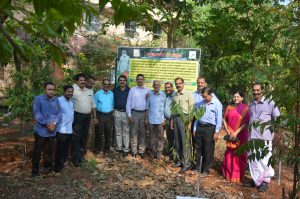
The Post Graduate Department of Botany at Payyanur College was originally established as a Biology Department when the college was founded in 1965. In 1981, it was elevated to a degree-granting department with the introduction of the B.Sc. Botany course. Initially, the department had three teaching staff members and one non-teaching staff member. As it transitioned into a degree department, four additional teachers and two non-teaching staff were appointed. In 2021, the department launched an innovative Post Graduate program, M.Sc. Plant Science with Bioinformatics, which is equivalent to an M.Sc. in Botany. Currently, the department has seven teaching faculty members, including a research guide, and two non-teaching staff. Four research scholars are currently pursuing their doctoral degrees in the department, contributing to its active research environment.
The department has established Memorandums of Understanding (MoUs) with prestigious institutions and organizations, including the MS Swaminathan Research Foundation, Kew Botanical Garden (England), Kunhimangalam and Thrikkaripur Grama Panchayats, and several other organizations.
Well-equipped for advanced studies and research, the department features four laboratories, an instrumentation room, a museum, and a dedicated departmental library housing approximately 1,700 books and journals. It also maintains a comprehensive herbarium with 500 species, a herbal garden with more than 300 species of medicinal plants, and a Rare, Endemic, and Threatened (RET) plant garden, ‘Johncy Vanam,’ with more than 100 threatened trees and climbers from the Western Ghats. The department also has a Bamboosetum. The greenhouse, named “Sanjeevani,” serves both as a conservatory for wild endemic species and as a repository for medicinal plants and wild orchids.
In addition to regular undergraduate (UG) and postgraduate (PG) programs, the Department of Botany offers one generic elective course and specialized Certificate Courses in Environmental Sustainability, Mushroom Cultivation, and Plant Propagation. Currently, the department provides a Certificate Course in Mushroom Cultivation. Beginning in 2024, as part of the implementation of the Four-Year Undergraduate Program (FYUGP), the department will introduce two minor courses and one multidisciplinary course.
The department actively fosters interactions between students and experts in research and environmental sustainability through seminars, invited talks, and institutional visits. Regular activities include field trips, remedial classes, tutorial sessions, mentoring, and cultural festivals. Our students consistently excel, securing university ranks and gaining admission to prestigious institutions both in India and abroad. They are well-prepared for diverse professional fields, including teaching, research, technology, and start-up ventures.
Functioning as a knowledge center, the department provides consultancy services to students from related disciplines in other institutes and to the general public. It also organizes and participates in various public and environmental awareness programs, such as ‘Naattumanchottil’ (propagation and conservation of traditional mango varieties), ‘Theeravanam’ (mangrove restoration program), ‘Kaavoottu’ (Sacred Grove restoration program), and ‘Participatory Biodiversity Register (PBR) Renewal of Grama Panchayats, in collaboration with government and non-government organizations.
